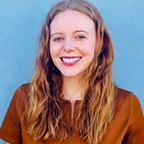100 Women, 100 Stories: Seisei Tatebe-Goddu
Where do you live? New York City — after 35 different mailing addresses
What is your profession? I’m the co-founder of TrainBlue, an organization that trains and empowers the people who woke up on November 9 and realized they needed to do whatever they could do protect their country and their neighbors.
Tell us more about starting this venture and what your path was leading up to this. Many of us were stunned by the election results in November. After a career spent in strategy and organizational development consulting, social impact startups, and marketing, I ended up working on the Operations team for the North Carolina Democratic Party Coordinated Campaign, where I had a front-row seat to the election and aftermath. It was brutal. After the election, I returned to NYC and decided to take the time to figure out what was next. I got involved with Arena Summit, a great organization that is working to recruit and resource potential political candidates, then with Forward Majority, a SuperPAC focused on state legislative races, and finally, after seeing amazing groups like Indivisible, Flippable, Swing Left, Sister District, and Brand New Congress pop up, realized that we had an incredible surge of activism but people needed opportunities to learn how to canvas and organize.
What did you study in school? I got a BA in environment & development, and a master’s degree in international affairs. But it was the intersection of my degrees with my education and experience in conflict resolution that I think has always remained a constant: at its core, the problems I see with any organization or movement trying to achieve impact is that there are communication problems — whether that is not having the right data or information, conveying it inaccurately or unskillfully, or just not knowing the best processes that can be applied to maximize productive conversations. The degrees were just catalysts for issues I was passionate about. I think we overemphasize (except for professional degrees like medicine and law) the need to link your degree to your career, especially for an 18-year old. Your education should teach you how to think — a skill that can be applied to nearly any field. In this economy, given all of the shifts people are making in their careers and the multidisciplinary nature of many of the things we’re being asked to do, five years in no one will really care what your degree was in. So just pick something that you love that will teach you how to think critically about the world and go from there.
Has anyone been a mentor to you? What role did they play and how do you feel about mentorship now? I would not be here without the many, many people who mentored me. I look at this particular group of people as my personal board of directors: I go to them when I have a major decision to make and need a sounding board; I count on them to tell me when they think I’m making the wrong move or need to shift my perspective; and they help me with brand recognition and social proof. I treat them as seriously as I would treat a board because these are the folks who, throughout my life and career, were the first ones to take a chance on an unproven kid or vouched for me with others or convinced me to see what they saw in me before I was able to see it myself. I look for ways to play this role to amazing young people because in a competitive world that belief in someone can make all the difference.
What’s the hardest thing that you’ve had to deal with in your career so far? I have a lot of interests and do a lot of things well. But at some point you need to decide what to focus on so that you can move forward in one direction instead of scattering your energy to the wind.
What has been a really rewarding moment in your career? Entering grad school when I was 28 was tough, but it made me realize how much I had accomplished, and that I was my toughest critic. Sometimes you’re so close to the work that it takes stepping back from everything to realize everything you’ve achieved: by the time I was 30 I had founded and run a company, worked with over 50 clients in 10 countries — often with the heads of UN agencies, private companies, and international NGOs as my clients — and had established a reputation as a strategic, thoughtful, insightful moderator and facilitator.
What do you want to accomplish in your lifetime? I’m focused on one thing right now: making sure that we protect the rights of our neighbors and communities over the next four years. I would like to know in 2020 that I did everything I could to right the ship. At some point in this craziness it would be nice to have a kid.
What’s something you want young women to remember when thinking about their future? You are capable. Don’t choose to close doors when everyone else around you is so eager to do it to you first.
You are powerful. You may not have control over life, but you have more control over who and what you become than you think you do.
You are strong. If you can teach yourself how to grieve, nothing can ever take you down (even if it feels that way temporarily).
What’s one thing you want to try to make an impact on in your lifetime? We are living in hard times right now and I am hyper-focused on making sure that people have the tools and skills they need to protect themselves and their neighbors. Let’s start there.
Where can people find you online if they’d like to connect with you?
LinkedIn: http://www.linkedin.com/in/seisei,
Instagram: instagram.com/seiseigoddu
